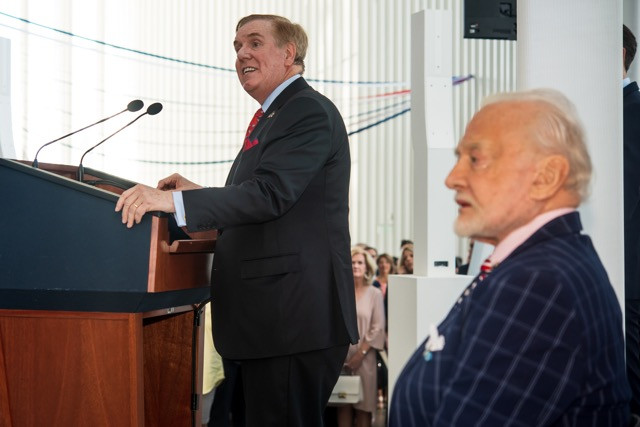When United States Secretary of Commerce Wilbur Ross and then Buzz Aldrin, the second man to set foot on the moon, came to the Grand Duchy of Luxembourg, many in the traditional space sector had to ask, “Why?” Although Luxembourg had been among the first countries to launch its own commercial satellite, few considered it among the players (big or small) in space.
When Luxembourg launched the Luxembourg Space Agency (LSA), the inevitable comparisons to NASA and the European Space Agency (ESA) began. Of course, compared to the resources, assets and size of those entities, the nascent LSA appeared to be little more than ‘smoke and mirrors’ (as one cynic put it).
But, the truth is that LSA has never pretended to be what NASA or ESA is.
Indeed, in some ways, it is the antithesis of what those agencies had become before the current Administration re-established the Vice President’s National Space Council and set a target of returning to the moon within five years – using both public AND private know-how and resources to do it.
Even though NASA succeeded in 1969 in landing a man on the moon and returning him safely, NASA came to the conclusion that working in partnership with commercial companies for the delivery of space services was a more efficient model to follow. When the U.S. was forced to hitch rides on Russian spacecraft for far longer than anticipated to get to the international space station, it was clear that enhancing the entrepreneurial innovative cutting-edge side of NASA was of paramount importance to returning astronauts to space from U.S. soil.
Meanwhile in recent years, Jeff Bezos, Elon Musk, and a host of other entrepreneurial private sector visionaries came along and began to test boundaries that heretofore had been solely relegated to governmental domains.
Two options existed. Ignore (or in some cases, even stifle with regulations) such efforts, or facilitate, encourage and most importantly, find ways to fund them.
Of course, one key component of private investment is the ability to achieve a return on that investment. (Governments investing such resources don’t expect the private return, but they do insist on the right of government control for the government’s purposes, including in some cases military ones.)
Against this backdrop, two countries adopted regulatory regimes that allowed private companies to earn and recover a return on their investment in space, including ownership of minerals recovered in space. Like fish in the sea (where fisherman can keep and sell what they catch), the United States and the Grand Duchy of Luxembourg adopted such legal frameworks – permitting those who invest to reap their harvest.
For Luxembourg, it was no easy thing. It had to break with the EU and follow the U.S. model – and it did.
In the aftermath, space companies flooded to Luxembourg.
And, with the new direction of this administration supporting joint public/private ventures, the United States government followed. First, Secretary Ross came to Luxembourg and signed the Memorandum of Understanding between the United States and Luxembourg. Then, director of the LSA Marc Serres went to the United States and signed with NASA director Jim Bridenstine the Joint Statement of intent between NASA and LSA.
For those looking at the LSA through the lens of a NASA or ESA model, it will be always disappointing. That is not what the LSA is.
But, for those understanding the importance of creating fertile fields for investment in emerging space companies with new and innovative technologies, it is something big.
Those who cast aspersions on this new facilitator of discovery identify themselves as vestiges of the institutional inertia that has at times in the past blocked the future.
On the other hand, for those who see Luxembourg for what it is – an important pathway for joint public-private partnerships to move faster and further than before, it is only exciting.
This is why Luxembourg matters so much now in space. It is the future – working together to achieve that of which we dream – to the stars and beyond.
J. Randolph “Randy” Evans is the current US ambassador to Luxembourg. Newt Gingrich was the 50th Speaker of the US House of Representatives, serving from 1995 to 1999. The views expressed in this piece are the authors’ and do not necessarily reflect Delano’s opinion.
